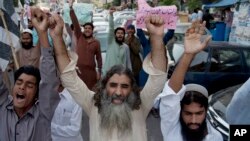Activists and supporters of Pakistani political parties October 12 took to streets of the southern port city of Karachi to protest against shelling on Pakistani border villages by neighbor India.
Indian firing across a disputed border with Pakistan has killed 12 civilians and injured 52 in Pakistan so far this month, according to a Sunday press release from the Foreign Ministry.
Sartaj Aziz, the adviser to Prime Minister, Nawaz Sharif, on national security and foreign affairs, said that officials from UNMOGIP, a U.N. observation team, were going to the disputed border to observe the ceasefire violations.
He also appealed to U.N. Secretary General, Ban Ki-moon, on Saturday for assistance in solving the long-running dispute with India over the status of Kashmir, according to the Sunday press release.
The protesters, from the political parties Sunni Tehreek and Jamiat-e-Ulema-e-Pakistan, chanted “Long live Pakistan” and “We have made Pakistan, we will save Pakistan”.
The demonstrators held banners in addition to Pakistani and party flags. One banner said “Indian aggression and terrorism on Pakistani border not acceptable.”
Senior leader of Sunni Tehreek, Shahid Ghauri, warned India against further acts of violence. “Indian shelling on our border villages is martyring our civilians. India should remain within its limits,” he told supporters.
“We want to tell United Nations, we want to tell the nations of the world that Pakistani people are not an ordinary nation,” Ghauri added.
Since the beginning of October, Pakistan and India have been firing mortars and machine-guns across the border, leading to the highest death toll in a decade among civilians on both sides.
It is unclear what started the intense firing, although officers who have served on the disputed Line of Control say that small incidents can rapidly escalate, as each side responds with ever-increasing force.
Since becoming independent from Britain in 1947, the two nuclear rivals have fought three wars, two over Kashmir.
Pakistan revived its demand for Kashmiris to be allowed to hold a plebiscite to decide the region's future, as called for by a U.N. resolution adopted in 1948. India has long opposed a plebiscite.
“For decades, Pakistan has been reminding the United Nations and the international community to fulfill that promise, in the interest of durable peace and security in the region,” Aziz said in his letter to Ban Ki-moon.
Former President and military ruler Pervez Musharraf had said in 2003 that he was prepared to set aside that demand in an effort to reach a settlement over Kashmir.
The disputed border running through Kashmir is heavily militarized on both sides. India frequently accuses Pakistan of backing militants who slip across the border and mount attacks in India.
India controls more than half of the disputed Himalayan region, and Pakistan controls around a third, while China holds 10 percent of the territory.






